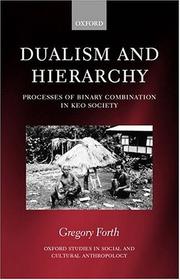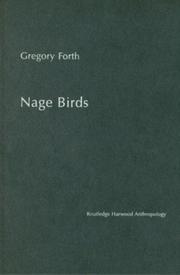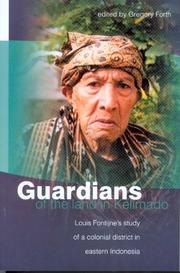| Listing 1 - 7 of 7 |
Sort by
|

ISBN: 9780198234241 0198234244 Year: 2001 Publisher: Oxford: Oxford university press,
Abstract | Keywords | Export | Availability | Bookmark
 Loading...
Loading...Choose an application
- Reference Manager
- EndNote
- RefWorks (Direct export to RefWorks)
Keo (Indonesian people) --- Moieties --- Human settlements --- Kinship. --- Marriage. --- Social life and customs. --- Flores Island (Indonesia) --- Ethnology --- Social life and customs --- Ethnology - Indonesia - Flores Island --- Human settlements - Indonesia - Flores Island --- Keo (Indonesian people) - Kinship. --- Keo (Indonesian people) - Marriage. --- Keo (Indonesian people) - Social life and customs. --- Moieties - Indonesia - Flores Island. --- Flores Island (Indonesia) - Social life and customs
Book
ISBN: 9781487510053 1487510055 9781487500047 1487500041 9781487520014 1487520018 1487510063 Year: 2016 Publisher: Toronto: University of Toronto press,
Abstract | Keywords | Export | Availability | Bookmark
 Loading...
Loading...Choose an application
- Reference Manager
- EndNote
- RefWorks (Direct export to RefWorks)
Why the Porcupine Is Not a Bird is a comprehensive analysis of knowledge of animals among the Nage people of central Flores in Indonesia. Gregory Forth sheds light on the ongoing anthropological debate surrounding the categorization of animals in small-scale non-Western societies. Forth's detailed discussion of how the Nage people conceptualize their relationship to the animal world covers the naming and classification of animals, their symbolic and practical use, and the ecology of central Flores and its change over the years. His study reveals the empirical basis of Nage classifications, which align surprisingly well with the taxonomies of modern biologists. It also shows how the Nage employ systems of symbolic and utilitarian classification distinct from their general taxonomy. A tremendous source of ethnographic detail, Why the Porcupine Is Not a Bird is an important contribution to the fields of ethnobiology and cognitive anthropology.--
Book
ISBN: 9024761697 9004287248 Year: 1981 Publisher: Brill
Abstract | Keywords | Export | Availability | Bookmark
 Loading...
Loading...Choose an application
- Reference Manager
- EndNote
- RefWorks (Direct export to RefWorks)
The author describes Rindi culture within an analytic framework that illustrates connexions between, and common principles among, often apparently disparate realms of thought and action. The book contains chapters on the house; the village and the domain (an aggregate of villages); space and cosmos; religion (the notions 'hamangu' and 'ndewa'; divinity and the ancestors; the powers of the earth); the cycle of life and death; social order (class stratification; the division of authority; descent groups) and the system of asymmetric prescriptive alliance by which it is governed; marriage prestations and the various ways of contracting a marriage. The study is based on 22 months of fieldwork.
Ethnology --- Manners and customs --- Sumba Island (Indonesia) --- Indonesia --- Social life and customs. --- Ceremonies --- Customs, Social --- Folkways --- Social customs --- Social life and customs --- Traditions --- Usages --- Civilization --- Etiquette --- Rites and ceremonies --- Cultural anthropology --- Ethnography --- Races of man --- Social anthropology --- Anthropology --- Human beings --- Pulau Sumba (Indonesia) --- Sandalwood Island (Indonesia) --- Soemba Island (Indonesia) --- Lesser Sunda Islands --- Endonèsie --- Indanezii︠a︡ --- Indoneshia --- Indoneshia Kyōwakoku --- Indonesië --- Indonesya --- Indonezia --- Indonezii︠a︡ --- Indonezija --- İndoneziya --- İndoneziya Respublikası --- Indūnīsīyā --- Induonezėjė --- Jumhūrīyah Indūnīsīyā --- PDRI (Pemerintah Darurat Republik Indonesia) --- Pemerintah Darurat Republik Indonesia --- R.I. (Republik Indonesia) --- Republic of Indonesia --- Republic of the United States of Indonesia --- Republica d'Indonesia --- Republiek van Indonesië --- Republik Indonesia --- Republik Indonesia Serikat --- Republika Indonezii︠a︡ --- Republika Indonezija --- Rėspublika Indanezii︠a︡ --- RI (Republik Indonesia) --- United States of Indonesia --- Yinni --- Рэспубліка Інданезія --- Република Индонезия --- Индонезия --- Інданезія --- إندونيسيا --- جمهورية إندونيسيا --- インドネシア --- インドネシア共和国 --- Dutch East Indies --- indonesia --- Betel --- Bride price --- Genealogy --- Marapu --- Patrilineality --- Ratu --- Sumba --- Village

ISBN: 9780415318273 0415318270 Year: 2004 Publisher: London: Routledge,
Abstract | Keywords | Export | Availability | Bookmark
 Loading...
Loading...Choose an application
- Reference Manager
- EndNote
- RefWorks (Direct export to RefWorks)
Ranging from issues of taxonomy and naming to the fascinating subject of birds' prophetic associations and their places in religious representations, myth, poetry and song, Gregory Forth's richly detailed work will be invaluable to students of ethnobiology, social and cultural anthropology, folklore, zoology and Southeast Asia."--Jacket. "This book describes in detail the relationship between the Nage people of eastern Indonesia and the birds whose environment they share. Based on more than a decade of ethnographic fieldwork, it explores the ways in which a human society interacts with members of another zoological class and attaches particular values to these in a variety of cultural and conceptual contexts. As well as a fascinating study of the local ornithology of the Indonesian island of Flores, Nage Birds provides a critical review of current theoretical debate regarding how non-western societies categorize and think about non-human forms of animal life.

ISBN: 9789004487840 9789067182232 Year: 2004 Publisher: Leiden; Boston : BRILL
Abstract | Keywords | Export | Availability | Bookmark
 Loading...
Loading...Choose an application
- Reference Manager
- EndNote
- RefWorks (Direct export to RefWorks)
In 1940, a Dutch colonial officer named Louis Fontijne (1902-1968) was commissioned to conduct an investigation of indigenous land tenure and leadership in the Residency of Timor and Dependencies. Dealing specifically with Kelimado, a region included in the Nage district of central Flores, its main product was a remarkable study of society and culture and the effects of over three decades of Dutch administration and Christian proselytizing. In regard to ethnographic detail and analytical insight, the work, entitled Grondvoogden in Kelimado , resembles more an academic thesis than a government report; yet another interest is Fontijne's forthright critique of colonial policy and recommendations for administrative reform.
Ethnology --- Nage (Indonesian people) --- Land tenure --- Social life and customs --- Flores Island (Indonesia) --- Social life and customs.
Book
Year: 1981 Publisher: The Hague Nijhoff
Abstract | Keywords | Export | Availability | Bookmark
 Loading...
Loading...Choose an application
- Reference Manager
- EndNote
- RefWorks (Direct export to RefWorks)
Book
ISBN: 906718120X 9004434844 9789067181204 9789004434844 Year: 1998 Volume: 177 Publisher: Leiden: KITLV Press,
Abstract | Keywords | Export | Availability | Bookmark
 Loading...
Loading...Choose an application
- Reference Manager
- EndNote
- RefWorks (Direct export to RefWorks)
Beneath the Volcano is the first major account of the Nage, who inhabit the central part of Flores in eastern Indonesia. The book focuses on Nage ideas concerning a variety of spiritual beings and how these influence both ritual practices and ideas about human beings. In exploring these subjects, the author sets out to uncover a classification of spirits. While quite different from taxonomies of natural beings, Nage ways of linking named categories of spirits nevertheless reveal a regular conceptual order. In describing this order, use is made of a version of Dumont's notion of 'encompassment'. Common ideas informing relations between Nage humans and several categories of spirits are further interpreted as instances of a pervasive principle of 'symmetric inversion', according to which human beings are spirits for the spirits.
Nage (Indonesian people) --- Ethnology --- Religion --- Flores Island (Indonesia) --- Godsdienst --- Kosmology --- Religion.
| Listing 1 - 7 of 7 |
Sort by
|

 Search
Search Feedback
Feedback About UniCat
About UniCat  Help
Help News
News